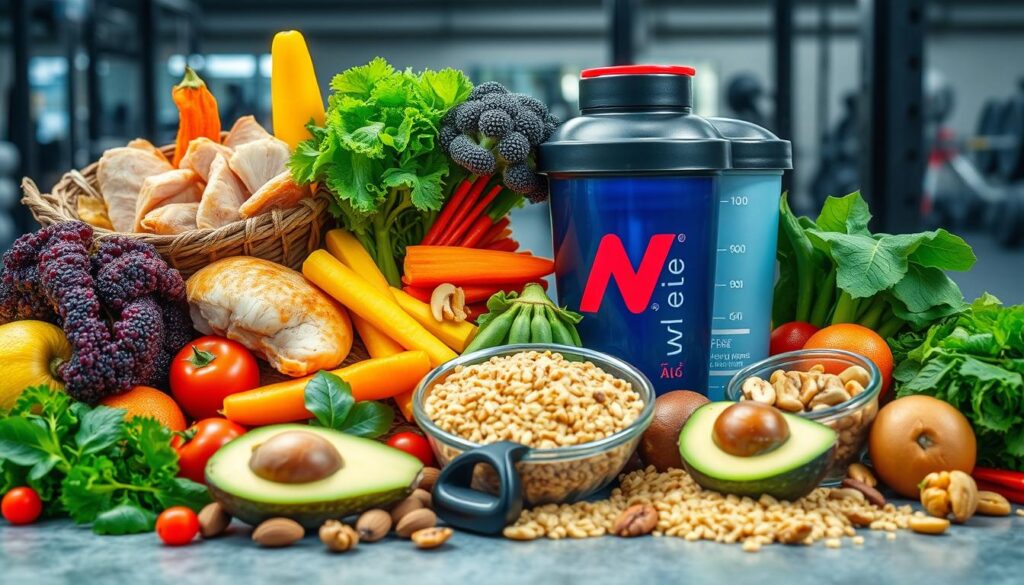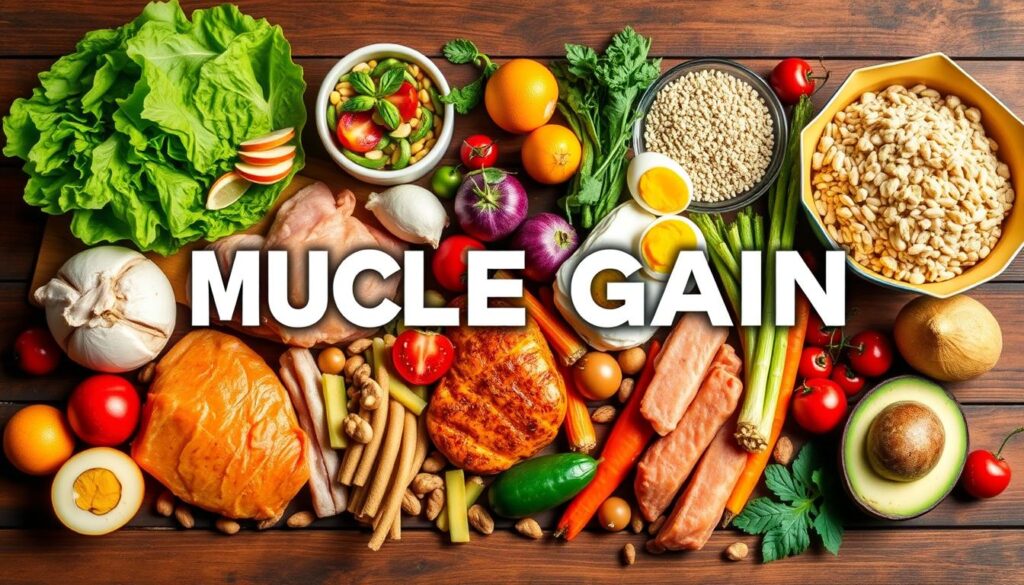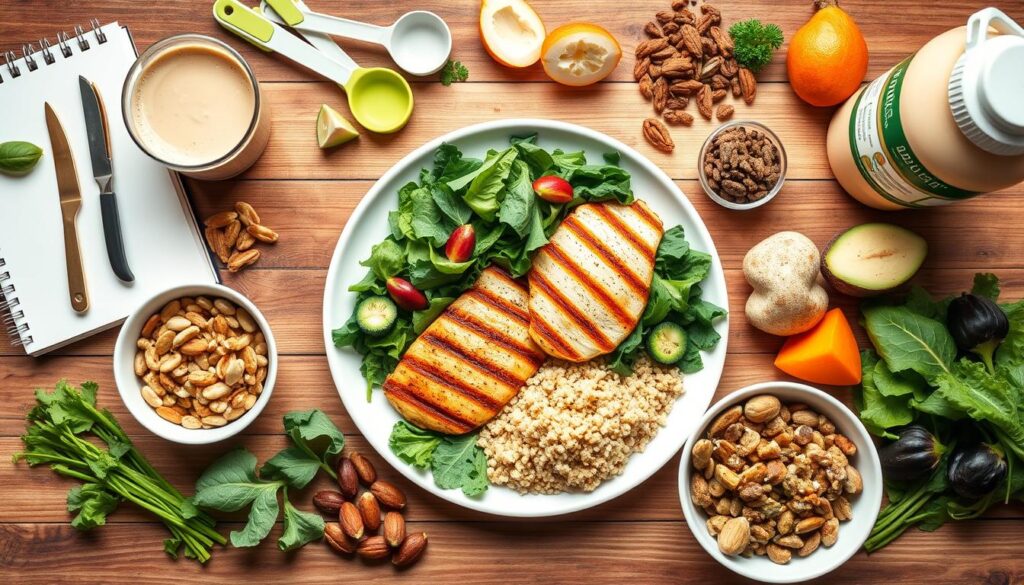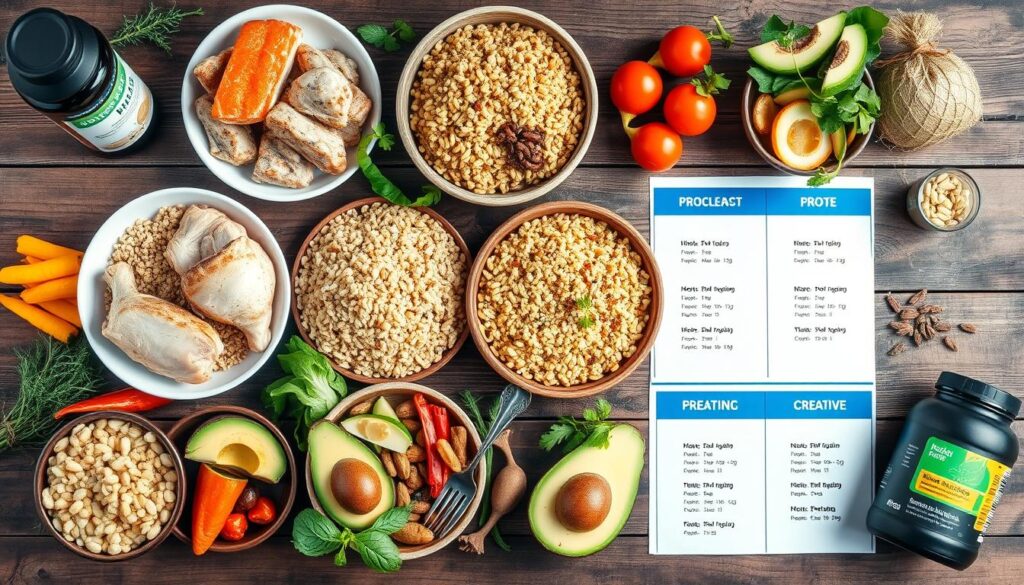Ever wondered why some people grow muscle fast while others don’t, even with hard workouts? The key often lies in a good nutrition plan for muscle gain. This plan is not just about eating more calories. It’s about finding the right mix of nutrients that help you work out better, recover faster, and build lean muscle.
The International Society of Sports Nutrition found that a well-made muscle gain nutrition plan boosts performance and results. Are you ready to learn how to improve your muscle-building with smart food choices?

Understanding the Basics of Muscle Gain
Gaining muscle needs a smart plan that mixes knowing how muscles grow with good training. At the core of muscle gain is hypertrophy, or growing muscle fibers through weight training. It’s key to be consistent in workouts and know how your body reacts during and after.
Muscle protein synthesis is a big part of lifting weights. It fixes muscle tears from hard exercise and helps muscles grow. Giving your body enough time to recover is also key, as it’s when muscles get stronger.
Studies by groups like the American College of Sports Medicine offer great tips for muscle gain. A good mix of training and the right diet is crucial. A diet plan made just for you can really boost your workout results.
Knowing these basics is the first step to a successful muscle gain plan. A complete approach that includes good nutrition and exercise can greatly improve your strength and look.
Nutrition Plan for Muscle Gain
Creating a good nutrition plan is key for muscle growth. It starts with understanding caloric surplus. This is the base for muscle growth. Also, knowing how to distribute macronutrients is crucial. This means getting the right amounts of proteins, carbs, and fats.
Caloric Surplus Explained
Eating more calories than you burn is called a caloric surplus. This extra energy helps muscles recover and grow. It’s important to keep track of your daily calories to stay in surplus. This way, your muscles can repair and grow after workouts, leading to better results over time.
Macronutrient Distribution
Knowing how to distribute macronutrients is important for muscle gain. A good ratio is about 30% protein, 50% carbs, and 20% fats. Protein helps repair and build muscles. Carbs give you energy for hard workouts. Fats help with hormone balance and energy, supporting your performance.

Components of an Effective Muscle Building Diet Plan
An effective muscle building diet plan includes key components. This part talks about the important macronutrients for muscle growth and health. Knowing where to get protein, carbs, and healthy fats is crucial for any muscle gain plan.
Protein Sources for Muscle Growth
Protein is the base of a good muscle building diet. It’s essential for fixing and growing muscles. Here are some top protein sources:
- Lean meats like chicken, turkey, and lean cuts of beef
- Fish such as salmon and tuna
- Dairy products like Greek yogurt and cottage cheese
- Legumes, including lentils and chickpeas
- Plant-based proteins like quinoa and tofu
Carbohydrates: The Energy Source
Carbs give you the energy for workouts. Focus on complex carbs for better stamina and performance. Add these carbs to your diet:
- Whole grains such as brown rice and oats
- Fruits like bananas, berries, and apples
- Vegetables including sweet potatoes and spinach
Healthy Fats and Their Role
Healthy fats are key for hormone balance and health, important for muscle growth. Make sure to include these fats in your diet:
- Avocados
- Nuts such as almonds, walnuts, and pistachios
- Seeds like chia seeds and flaxseeds
- Oils such as olive oil and coconut oil
Getting the right mix of these nutrients supports muscle growth and boosts health and fitness.
Creating Your Muscle Building Meal Plan
Creating a muscle building meal plan needs careful thought about what you eat and when. Focus on foods that are full of nutrients to help your muscles recover and grow. Here are some meal ideas that fit a healthy diet and timing tips.
Sample Meal Ideas
- Breakfast: Oatmeal with fresh fruits and a scoop of protein powder.
- Snack: Greek yogurt with nuts and honey.
- Lunch: Grilled chicken breast, quinoa, and steamed broccoli.
- Snack: A protein shake with a banana.
- Dinner: Baked salmon, sweet potatoes, and a side salad.
Timing Your Nutrient Intake
Timing your meals right can really help you build muscle. Eat a meal with carbs and proteins 30 to 60 minutes before working out. This gives you energy. After working out, eat something with protein and carbs to help your muscles recover.

Supplementation in Muscle Gain Nutrition
Adding supplements to your diet can really boost your muscle gain efforts. Protein supplements like whey and casein are key. They help you hit your daily protein goals. Knowing which supplements work best is key to success in building muscle.
Understanding Protein Supplements
Protein supplements make it easy to get more protein. Whey protein, made from milk, is fast to absorb and packed with amino acids. It’s perfect after working out. Casein protein, slower to digest, releases amino acids over time. It’s great for before bed.
Both types are important for building muscle. They help you follow a good nutrition plan for muscle mass.
Other Helpful Supplements
There are other supplements that can help too. Here are a few:
- Creatine: Boosts strength and energy.
- Branched-Chain Amino Acids (BCAAs): Lessens muscle soreness and aids recovery.
- Omega-3 Fatty Acids: Good for health and may lower muscle inflammation.
Choosing quality supplements is crucial. The National Institutes of Health stresses the importance of safe, effective ones. Adding these supplements to your diet can give you a big boost in muscle growth.

| Supplement | Benefits | Usage |
|---|---|---|
| Whey Protein | Quick absorption, ideal post-workout | 1-2 scoops after exercise |
| Casein Protein | Slow release of amino acids, good before sleep | 1 scoop before bedtime |
| Creatine | Increases strength and energy | 5g daily, can be loaded initially |
| BCAAs | Reduces muscle soreness | During or after workouts |
| Omega-3 Fatty Acids | Reduces inflammation and supports recovery | 1-3g daily, with meals |
Nutritional Strategies for Fat Loss while Gaining Muscle
Many people struggle to lose fat while gaining muscle. A balanced diet is key to this challenge. It’s about losing fat and gaining muscle at the same time.
Keeping a balance in calories is crucial. A small calorie deficit helps with fat loss. But, don’t forget to eat enough protein to keep and grow muscle. A healthy diet with the right mix of nutrients is important.
- Eat lean proteins like chicken, turkey, and plant-based foods like lentils and chickpeas.
- Choose complex carbs like quinoa, sweet potatoes, and brown rice for energy.
- Add healthy fats from avocados, nuts, and olive oil for health.
Keeping track of what you eat is important. Use apps or journals to monitor your diet. This helps you make better choices and stay on track.
By following these tips, you can achieve your goals. A well-planned diet is essential for losing fat and gaining muscle.
Conclusion
An effective nutrition plan is key for muscle gain. Knowing how to balance your diet is crucial. This includes the right mix of protein, carbs, and fats for muscle growth.
Following muscle gain tips like eating nutrient-rich foods and timing meals can boost your results. Quality protein sources and supplements also play a big role. Remember, losing fat while gaining muscle is important too.
Creating a nutrition plan that fits your lifestyle is essential. Use the tips from this article to improve your diet. This will help you gain muscle and stay healthy in the long run.
FAQ
What is an effective nutrition plan for muscle gain?
A good nutrition plan for muscle gain includes proteins, carbs, and fats. You need more calories than usual to grow muscles. Eating a variety of foods helps get all the vitamins and minerals you need.
How many calories do I need for a muscle gain nutrition plan?
The calories you need depend on your age, weight, and how active you are. Aim for 250-500 more calories than you normally eat to gain muscle.
What macronutrient distribution is best for muscle gain?
For muscle gain, eat about 30% protein, 50% carbs, and 20% fats. This mix gives you energy for workouts and helps your muscles grow.
What are some good protein sources for a muscle building meal plan?
Great protein sources include chicken, turkey, fish, eggs, and dairy. Legumes and plant-based proteins like quinoa and tofu are also good. Eating a variety helps your muscles repair and grow.
How does nutrient timing affect muscle growth?
Nutrient timing means eating the right foods at the right time. Eating protein and carbs before and after workouts helps your muscles recover and grow. Try to eat within 30 minutes to 2 hours after working out.
Are protein supplements necessary for muscle gain?
While food should be your main source of protein, supplements can help if you’re struggling to get enough. Whey and casein protein are popular choices.
What role do carbohydrates play in a muscle building diet plan?
Carbs are key because they give you energy for hard workouts. They help your muscles recover and perform better. Choose complex carbs like whole grains, fruits, and veggies.
Can I lose fat while building muscle?
Yes, you can lose fat and gain muscle at the same time. This is called body recomposition. It involves eating the right amount of calories, focusing on protein, and doing both strength training and cardio.
